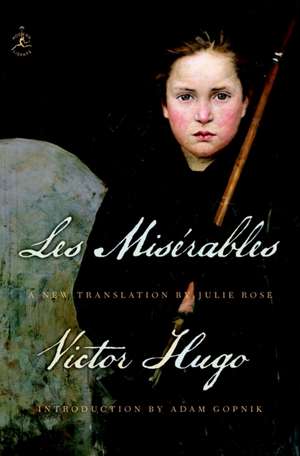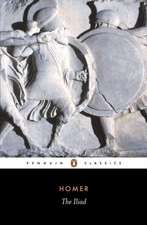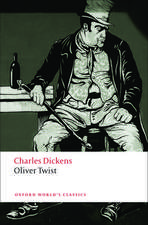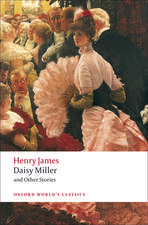Les Miserables
Autor Victor Hugoen Limba Engleză Hardback – 11 iun 2008
| Toate formatele și edițiile | Preț | Express |
|---|---|---|
| Paperback (20) | 45.16 lei 3-5 săpt. | +8.98 lei 7-13 zile |
| World Scientific Publishing Company – 16 ian 2024 | 45.16 lei 3-5 săpt. | +8.98 lei 7-13 zile |
| Classics Illustrated Comics – 31 mar 2009 | 50.34 lei 3-5 săpt. | +5.59 lei 7-13 zile |
| Simon&Schuster – 30 apr 2005 | 59.76 lei 3-5 săpt. | |
| Signet Classics – 30 sep 2013 | 73.24 lei 3-5 săpt. | +24.29 lei 7-13 zile |
| CANTERBURY CLASSICS – 11 noi 2012 | 86.65 lei 28-40 zile | +55.94 lei 7-13 zile |
| CreateSpace Independent Publishing Platform – 6 dec 2015 | 87.78 lei 3-5 săpt. | |
| CREATESPACE – | 90.99 lei 3-5 săpt. | |
| Vintage Publishing – 5 noi 2009 | 91.60 lei 21-33 zile | +48.48 lei 7-13 zile |
| Ebury Publishing – 27 dec 2018 | 100.88 lei 21-33 zile | +50.00 lei 7-13 zile |
| CREATESPACE – | 126.93 lei 3-5 săpt. | |
| CREATESPACE – | 128.16 lei 3-5 săpt. | |
| CREATESPACE – | 184.11 lei 3-5 săpt. | |
| CreateSpace Independent Publishing Platform – | 185.28 lei 3-5 săpt. | |
| – | 198.38 lei 3-5 săpt. | |
| – | 207.88 lei 3-5 săpt. | |
| Hansebooks – 6 dec 2022 | 220.68 lei 3-5 săpt. | |
| BALLANTINE BOOKS – 31 aug 1996 | 103.27 lei 6-8 săpt. | |
| Samuel French Ltd – 26 apr 2015 | 107.94 lei 6-8 săpt. | |
| Simon & Brown – 31 mar 2011 | 377.33 lei 38-45 zile | |
| Waking Lion Press – 30 noi 2012 | 391.97 lei 6-8 săpt. | |
| Hardback (7) | 52.79 lei 3-5 săpt. | +35.92 lei 7-13 zile |
| Pan Macmillan – 5 sep 2016 | 52.79 lei 3-5 săpt. | +35.92 lei 7-13 zile |
| Baker Street Press – noi 2018 | 63.36 lei 3-5 săpt. | +8.56 lei 7-13 zile |
| CLASSIC COMIC STORE LTD – 30 iun 2019 | 64.61 lei 3-5 săpt. | +13.10 lei 7-13 zile |
| EVERYMAN – mai 1998 | 104.43 lei 21-33 zile | +86.54 lei 7-13 zile |
| Penguin Books – 24 oct 2012 | 175.48 lei 3-5 săpt. | +46.03 lei 7-13 zile |
| KUPERARD (BRAVO LTD) – 11 iun 2008 | 216.87 lei 3-5 săpt. | +85.94 lei 7-13 zile |
| – | 434.00 lei 38-45 zile |
Preț: 216.87 lei
Nou
41.50€ • 43.33$ • 34.34£
Carte disponibilă
Livrare economică 14-28 martie
Livrare express 28 februarie-06 martie pentru 95.93 lei
Specificații
ISBN-10: 0679643338
Pagini: 1330
Dimensiuni: 165 x 239 x 69 mm
Greutate: 1.84 kg
Editura: KUPERARD (BRAVO LTD)
Notă biografică
Julie Rose’s acclaimed translations include Alexandre Dumas’s The Knight of Maison-Rouge and Racine’s Phèdre, as well as works by Paul Virilio, Jacques Rancière, Chantal Thomas, and many others. She is a recipient of the PEN medallion for translation and the New South Wales Premier’s Translation Prize.
Adam Gopnik is the author of Paris to the Moon and Through the Children’s Gate, and editor of the Library of America anthology Americans in Paris. He writes on various subjects for The New Yorker and has written introductions to works by Maupassant, Balzac, Proust, and Alain-Fournier.
Descriere
Now a major musical film from Oscar-winning director Tom Hooper (The King's Speech), starring Hugh Jackman, Russell Crowe and Anne Hathaway, and also featuring Amanda Seyfreid, Helena Bonham-Carter and Sacha Baron-Cohen, Victor Hugo's Les Misérables is one of the great works of western literature.
Victor Hugo's tale of injustice, heroism and love follows the fortunes of Jean Valjean (Hugh Jackman), an escaped convict determined to put his criminal past behind him. But his attempts to become a respected member of the community are constantly put under threat: by his own conscience, when, owing to a case of mistaken identity, another man is arrested in his place; and by the relentless investigations of the dogged Inspector Javert (Russell Crowe). It is not simply for himself that Valjean must stay free, however, for he has sworn to protect the baby daughter of Fantine (Anne Hathaway), driven to prostitution by poverty.
Victor Hugo (1802-85) wrote volumes of criticism, Romantic costume dramas, satirical verse and political journalism but is best remembered for his novels, especially Notre-Dame de Paris (1831), also known as The Hunchback of Notre-Dame and Les Misérables (1862) which was adapted into one of the most successful musicals of all time.
'All human life is here'
Cameron Mackintosh, producer of the musical Les Misérables
'One of the half-dozen greatest novels of the world'
Upton Sinclair
'A great writer - inventive, witty, sly, innovatory'
A. S. Byatt, author of Possession
Cuprins
Schön Rosmarin
Bergsommer
Walzer-Ländler
Extras
In 1815, Monsieur Charles-François-Bienvenu Myriel was bishop of Digne.1 He was an elderly man of about seventy-five and he had occupied the seat of Digne since 1806.
There is something we might mention that has no bearing whatsoever on the tale we have to tell—not even on the background. Yet it may well serve some purpose, if only in the interests of precision, to jot down here the rumors and gossip that had circulated about him the moment he first popped up in the diocese. True or false, what is said about people often has as much bearing on their lives and especially on their destinies as what they do. Monsieur Myriel was the son of a councillor of the Aix parliament, a member of the noblesse de robe.2 They reckoned his father had put him down to inherit his position and so had married him off very early in the piece when he was only eighteen or twenty, as they used to do quite a lot in parliamentary families. Charles Myriel, married or no, had, they said, set tongues wagging. He was a good-looking young man, if on the short side, elegant, charming, and witty; he had given the best years of his life thus far to worldly pursuits and love affairs. Then the Revolution came along, events spiraled, parliamentary families were wiped out, chased away, hunted, scattered. Monsieur Charles Myriel emigrated to Italy soon after the Revolution broke out. His wife died there of the chest infection she’d had for ages. They had no children. What happened next in the destiny of Monsieur Myriel? The collapse of the old society in France, the fall of his own family, the tragic scenes of ’93,3 which were, perhaps, even more frightening for émigrés4 watching them from afar with the magnifying power of dread—did these things cause notions of renunciation and solitude to germinate in his mind? Was he, in the middle of the distractions and amorous diversions that filled his life, suddenly hit by one of those mysterious and terrible jolts that sometimes come and strike at the heart, bowling over the man public calamities couldn’t shake, threatening as these did only his existence and his fortune? No one could say; all that was known was that, when he came back from Italy, he was a priest.
In 1804,5 Monsieur Myriel was the curé of Brignolles.6 He was already old and lived like a real recluse in profound seclusion.
Around the time of the coronation, a small parish matter—who can remember what now?—took him to Paris. Among other powerful persons, he called on Cardinal Fesch,7 Napoléon’s uncle, to petition him on his parishioners’ behalf. One day when the emperor was visiting his uncle, the worthy curé, who was waiting in the anteroom, found himself in His Majesty’s path. Napoléon, seeing the old boy give him the once-over with a certain curiosity, wheeled round and said brusquely: “Who is this little man staring at me?”
“Your Majesty,” said Monsieur Myriel, “you see a little man, and I see a great man. Both of us may benefit.”
That very night, the emperor asked the cardinal what the curé’s name was and some time after that Monsieur Myriel was stunned to learn that he’d been named bishop of Digne.
But, when all’s said and done, what was true in the tales told about the first phase of Monsieur Myriel’s life? No one could tell. Few families had known the Myriel family before the Revolution.
Monsieur Myriel had to endure the fate of every newcomer in a small town, where there are always plenty of mouths blathering and not many brains working. He had to endure it even though he was the bishop, and because he was the bishop. But, after all, the talk in which his name cropped up was perhaps nothing more than talk; hot air, babble, words, less than words, pap, as the colorful language of the Midi8 puts it.
Whatever the case, after nine years as the resident bishop of Digne, all the usual gossip that initially consumes small towns and small people had died and sunk without a trace. No one would have dared bring it up, no one would have dared remember what it was.
Monsieur Myriel arrived in Digne accompanied by an old spinster, Mademoiselle Baptistine, who was his sister and ten years his junior.
They had only one servant, a woman the same age as Mademoiselle Baptistine, called Madame Magloire. Having been the servant of Monsieur le curé, she now went by the double title of personal maid to Mademoiselle and housekeeper to Monseigneur.9
Mademoiselle Baptistine was a tall, pale, thin, sweet person, the personification of that ideal expressed by the word respectable; for it seems a woman must be a mother to be esteemed. She had never been pretty, but her entire life, which had been merely a succession of holy works, had ended up laying a sort of whiteness and brightness over her; as she aged, she had gained what you could describe as the beauty of goodness. What had been skinniness in her youth had become transparency with maturity; and this diaphanous quality revealed the angel within. She was more of a spirit than a virgin. She seemed a mere shadow with scarcely enough of a body to have a gender; just a bit of matter bearing a light, with great big eyes always lowered to the ground, an excuse for a spirit to remain on earth.
Madame Magloire was a little old lady, white skinned, plump, round, busy, always wheezing, first because of always bustling about and second because of her asthma.
When he first arrived, Monsieur Myriel was set up in his episcopal palace with all the honors required by imperial decree, which ranked bishops immediately after field marshals.10 The mayor and the president of the local council were the first to visit him, and on his side, he made his first visits to the general and the chief of police.
Once he had moved in, the town waited to see their bishop on the job.
II. Monsieur Myriel Becomes Monseigneur Bienvenu
The episcopal palace of Digne was next door to the hospital. The episcopal palace was a vast and handsome town house built in stone at the beginning of the previous century by Monseigneur Henri Puget, doctor of theology of the faculty of Paris and abbé of Simore,1 who had been bishop of Digne in 1712. The palace was truly a mansion fit for a lord. Everything about it was on the grand scale, the bishop’s apartments, the drawing rooms, the bedrooms, the main courtyard, which was huge, with covered arcades in the old Florentine style, and the gardens planted with magnificent trees. It was in the dining room, which was a long and superb gallery on the ground floor opening onto the grounds, that Monseigneur Henri Puget had, on July 29, 1714, ceremoniously fed the ecclesiastical dignitaries, Charles Brûlart de Genlis, archbishop prince of Embrun, Antoine de Mesgrigny, Capuchin bishop of Grasse, Philippe de Vendôme, grand prior of France, abbé of Saint-Honoré de Lérins, François de Berton de Crillon, bishop baron of Vence, César de Sabran de Forcalquier, lord bishop and lord of Glandève, and Jean Soanen, priest of the oratory, preacher in ordinary to the king, lord bishop of Senez.2 The portraits of these seven reverend fathers embellished the dining room and the memorable date of July 29, 1714, was engraved there in gold lettering on a white marble panel.
The hospital was a low, narrow, single-story house with a small garden.
Three days after his arrival, the bishop visited the hospital. When his visit was over, he politely begged the director to accompany him back to his place.
“Monsieur le directeur, how many sick people do you have in your hospital at the moment?”
“Twenty-six, Monseigneur.”
“That’s what I counted,” said the bishop.
“The beds are all jammed together,” the director went on.
“That’s what I noticed.”
“The living areas are just bedrooms, and they’re difficult to air.”
“That’s what I thought.”
“Then again, when there’s a ray of sun, the garden’s too small for the convalescents.”
“That’s what I said to myself.”
“As for epidemics, we’ve had typhus this year, and two years ago we had miliary fever—up to a hundred were down with it at any one time. We don’t know what to do.”
“The thought did strike me.”
“What can we do, Monseigneur?” said the director. “You have to resign yourself to it.”
This conversation took place in the dining-room gallery on the ground floor. The bishop fell silent for a moment, then suddenly turned to the hospital director.
“Monsieur,” he said, “how many beds do you think you could get in this room alone?”
“Monseigneur’s dining room?” cried the astonished director.
The bishop sized up the room, giving the impression he was taking measurements and making calculations by eye alone.
“It could easily hold twenty beds!” he mumbled, as though talking to himself. Then he spoke more loudly. “Look, my dear director, I’ll tell you what. There has obviously been a mistake. There are twenty-six of you in five or six small rooms. There are three of us here and we’ve got enough room for sixty. There’s been a mistake, I’m telling you. You’ve got my place and I’ve got yours. Give me back my house. This is your rightful home, here.”
The next day, the twenty-six poor were moved into the bishop’s palace and the bishop was at the hospital.
Monsieur Myriel had no property, his family having lost everything in the Revolution. His sister got an annuity of five hundred francs, which was enough for her personal expenses, living at the presbytery. Monsieur Myriel received a salary of fifteen thousand francs from the government as bishop. The very day he moved into the hospital, Monsieur Myriel decided once and for all to put this sum to use as follows. We transcribe here the note written in his hand.
household expenditure
For the small seminary 1500 livres
Mission congregation 100 livres
For the Lazarists of Montdidier 100 livres
Seminary of foreign missions in Paris 200 livres
Congregation of the Saint-Esprit 150 livres
Religious institutions in the Holy Land 100 livres
Societies of maternal charity 300 livres
For the one at Arles 50 livres
For the betterment of prisons 400 livres
For the relief and release of prisoners 500 livres
For the release of fathers of families imprisoned for debt 1000 livres
Salary supplement for poor schoolteachers in the diocese 2000 livres
Upper Alps public granary 100 livres
Ladies’ Association of Digne, Manosque, and Sisteron,3 for the free education of poor girls 1500 livres
For the poor 6000 livres
My personal expenses 1000 livres
total 15000 livres
The whole time Monsieur Myriel held the see of Digne, he made almost no change in this arrangement—what he called, as we shall see, “taking care of his household expenses.”
Mademoiselle Baptistine accepted the arrangement with absolute submission. For this devout spinster, Myriel was both her brother and her bishop, the friend she grew up with and her superior according to ecclesiastical authority. Quite simply, she loved him and revered him. When he spoke, she listened, and when he took action, she was right behind him. Only the servant, Madame Magloire, grumbled a bit. As you will have noticed, the bishop kept only a thousand livres for himself which, added to Mademoiselle Baptistine’s pension, meant fifteen hundred francs a year. The two old women and the old man all lived on those fifteen hundred francs.
And when some village curé came to Digne, the bishop still managed to find a way of entertaining him, thanks to the assiduous scrimping and saving of Madame Magloire and Mademoiselle Baptistine’s clever management.
One day, when the bishop had been in Digne for about three months, he said, “With all that, things are pretty tight!”
“They certainly are!” cried Madame Magloire. “Monseigneur hasn’t even claimed the money the département owes him for the upkeep of his carriage in town and his rounds in the diocese. In the old days, that was standard for bishops.”
“You’re right, Madame Magloire!” the bishop agreed. And he put in his claim.
A short while later, after considering this application, the department council voted him an annual stipend of three thousand francs, under the heading, Bishop’s Allowance for Carriage Upkeep, Postal Costs, and Travel Expenses Incurred in Pastoral Rounds.
The local bourgeoisie was up in arms over this and an imperial senator,4 who had been a member of the Council of Five Hundred5 promoting the Eighteenth Brumaire and was now provided with a magnificent senatorial seat near Digne township, wrote a cranky little private letter to the minister of public worship, Monsieur Bigot de Préameneu.6 We produce here a genuine extract of a few lines:
“Carriage upkeep? Whatever for, in a town with less than four thousand people? Travel expenses incurred in pastoral rounds? To start with, what’s the good of them anyway? And then, how the hell does he do the rounds by post chaise in such mountainous terrain? There are no roads. One has to proceed on horseback. Even the bridge over the Durance at Château-Arnoux7 can barely take a bullock-drawn cart. All these priests are the same. Greedy and tight. This one played the good apostle when he first turned up. Now he acts like all the rest. He must have a carriage and a post chaise. He must have luxury, the same as the old bishops. Oh, these bloody clergy! Monsieur le comte, things will only come good when the emperor has delivered us from these pious swine. Down with the pope! [Things were not good with Rome at that point.]8 As for me, I’m for Caesar alone.” And so on and so forth.
Madame Magloire, on the other hand, was delighted.
“Hooray!” she said to Mademoiselle Baptistine. “Monseigneur put the others first but he’s wound up having to think of himself, finally. He’s fixed up all his charities. Here’s three thousand livres for us. At last!”
The same night, the bishop wrote a note, which he handed to his sister. It went like this:
carriage upkeep and travel expenses
Beef broth for the sick in the hospital 1500 livres
For the society of maternal charity of Aix 250 livres
For the society of maternal charity of Draguignan 250 livres
For abandoned children 500 livres
For orphans 500 livres
total 3000 livres
And that was Monsieur Myriel’s budget.
As for the cost of episcopal services, redemptions, dispensations, baptisms, sermons, consecrations of churches and chapels, marriages and so on, the bishop took from the rich all the more greedily for giving it all to the poor.
It wasn’t long before offerings of money poured in. The haves and the have-nots all knocked on Monsieur Myriel’s door, some coming in search of the alms that the others had just left. In less than a year, the bishop became treasurer of all works of charity and cashier to all those in distress. Large sums passed through his hands, but nothing could make him change his style of life in the slightest or get him to embellish his spartan existence by the faintest touch of the superfluous.
Far from it. As there is always more misery at the bottom of the ladder than there is fraternity at the top, everything was given away, so to speak, before it was received, like water on thirsty soil. A lot of good it did him to be given money, he never had any. And so, he robbed himself.
The custom being for bishops to put their full baptismal names at the head of their mandates and pastoral letters, the poor people of the area had chosen, out of a sort of affectionate instinct, the one among all the bishop’s various names that made the most sense to them, and so they called him Monseigneur Bienvenu—Welcome. We’ll do likewise whenever the occasion arises. Besides, the nickname tickled him.
“I like that name,” he said. “Bienvenu pulls Monseigneur into line.”
We are not saying that the portrait of the man we offer here is accurate; we will restrict ourselves to the claim that it is a passing likeness.
From the Hardcover edition.
Recenzii
—Jeanette Winterson, The Times (London)
“[A] magnificent story… marvelously captured in this new unabridged translation by Julie Rose.”
—The Denver Post
“A new translation by Julie Rose of Hugo’s behemoth classic that is as racy and current and utterly arresting as it should be.”
—Buffalo News (editor’s choice)
“Vibrant and readable, idiomatic and well suited to a long narrative, [Julie Rose’s new translation of Les Miserables] is closer to the captivating tone Hugo would have struck for his own contemporaries.”
—Diane Johnson
“A lively, dramatic, and wonderfully readable translation of one of the greatest 19th-century novels.”
—Alison Lurie
“Some of us may have read Les Miserables back in the day, but… between Gopnik and Rose, you’ll get two introductions that will offer you all the pleasures of your college instruction with none of the pain.”
—The Agony Column (trashotron.com)
From the Hardcover edition.


























